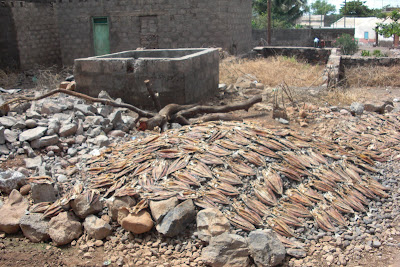 In mid-October we flew to Mindelo, Cape Verde to visit and train the new humanitarian couple, Elder Larry & Sister Pat Goff.
In mid-October we flew to Mindelo, Cape Verde to visit and train the new humanitarian couple, Elder Larry & Sister Pat Goff. 
Elder Goff served an earlier mission as a young man in Brazil, and has bravely returned with a rusty knowledge of Portuguese. Sister Goff is even braver. She is relying totally on her husband's rusty memory of Portuguese. Now that's faith. They're a great couple, ready for the work.


After two days in Mindelo, we flew with James Travas to the island of Sao Nicolau for a wheelchair distribution. Sao Nicolau's main--and perhaps only--industry is fishing--the main dish on the menu in every restaurant. And, everyone's a fisherman on this island.





...and a bridge here somewhere...


During another rain a week earlier, a mother and two children died on the island when flood waters brought large rocks down on their home during the night. The man above is the husband and father of this family, and though injured, managed to survive the flood.

Sao Nicolau is a beautiful, green island full of rocky mountains and narrow canyons. The same elements that makes it so beautiful, also make it a dangerous place to live. Though these homes are just above the village below, they are completely cut off from the rest of the island. There are no roads to reach them, and their donkey paths are washed away. All supplies must be hand carried for nearly 7 miles uphill.

It is gratifying to know that simple things, and little money can help offer a giant step towards advanced sustainability for organizations who serve these the disabled and elderly. On our first glance at this particular facility, it would be easy to start adding furniture and comfort items--perhaps a chair or sofa. But that would be our Western view of the necessities of life. Though it is sparse of furniture, it is clean and neat, and has provides home and comfort for the four blind men who live here.
The men in this home are cared for by a single mother and her 12 year old son, who live in the facility with them. This creates another aspect to the facility. While meeting the needs of the disabled men, it provides a home and livelihood for the mother and her son. We thought this was an ingenious way to meet the needs of both groups of people.


Since food is something people cannot live without, we asked E/S Goff if they would consider a project with the organization to help furnish their kitchen. During the day, they shopped the village for a new stove, refrigerator and pots and pans to help the organization meet the needs of the elderly and disabled in their village. Now they can more efficiently serve two meals a day for 30 disabled people and their caregivers--including the blind men at the home.

Though there was still much more to do in Tarrafall, Sao Nicolau, we found time to....




...and staying in practice for ....

...our own little grands.....










 That afternoon....we jumped on the plane for Cape Verde with a connection in Lisbon, where we met the
That afternoon....we jumped on the plane for Cape Verde with a connection in Lisbon, where we met the 







 Counted the number of stray dogs in town. No leash laws here.
Counted the number of stray dogs in town. No leash laws here.






 Nicosia, once the capital city, is now a city cut in half. One side is occupied by Turks--the other by Cyprians.
Nicosia, once the capital city, is now a city cut in half. One side is occupied by Turks--the other by Cyprians. 
